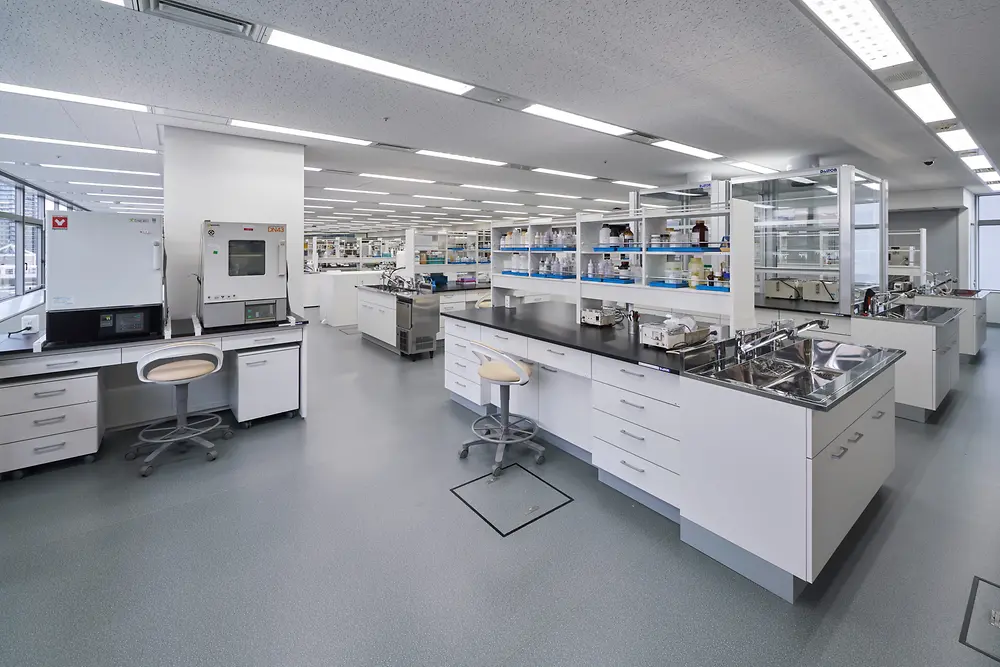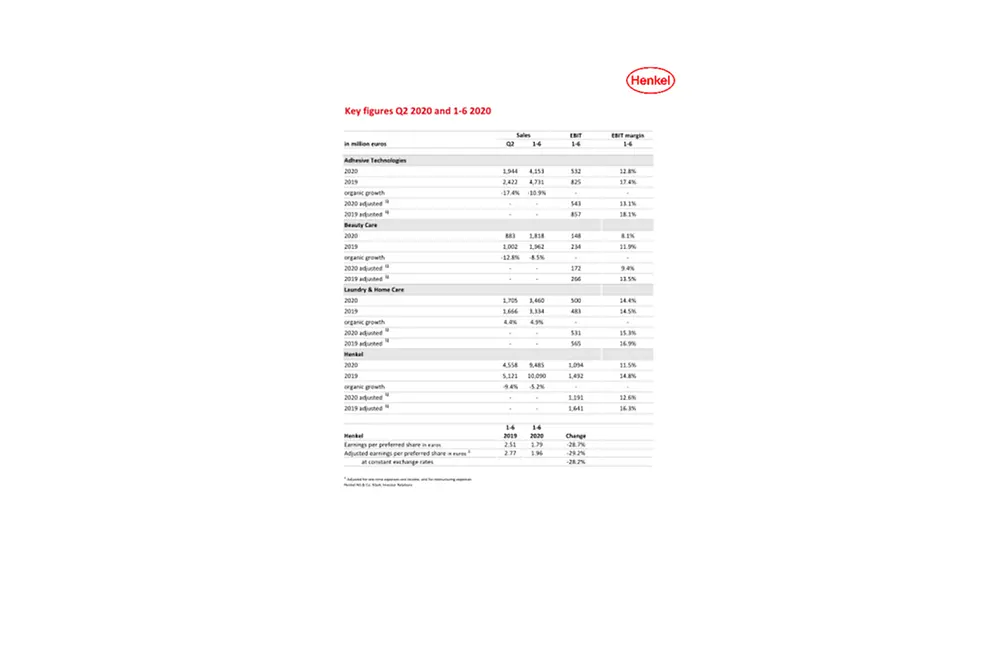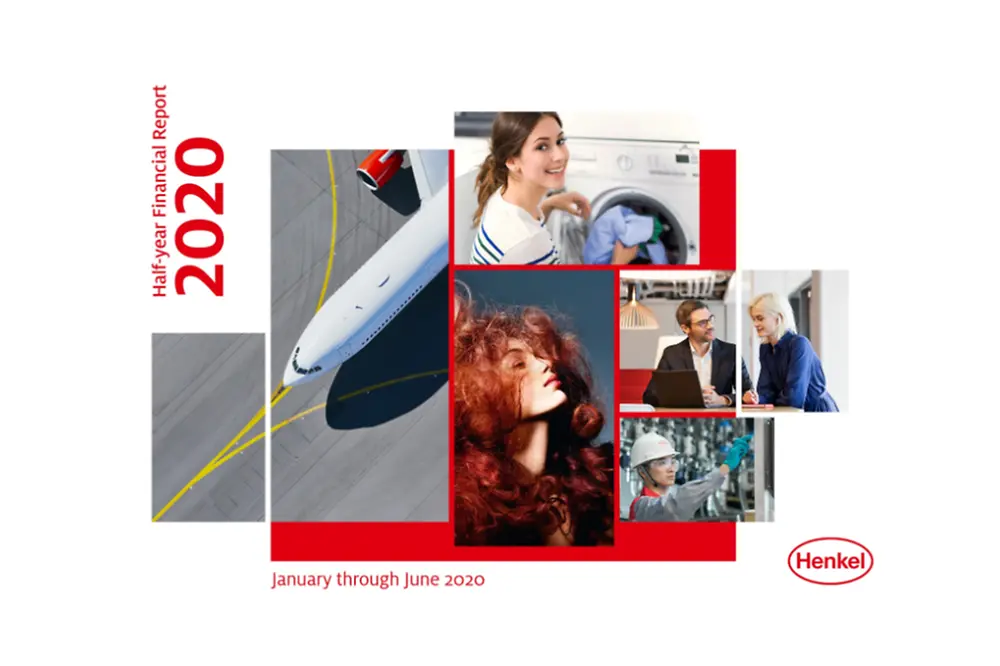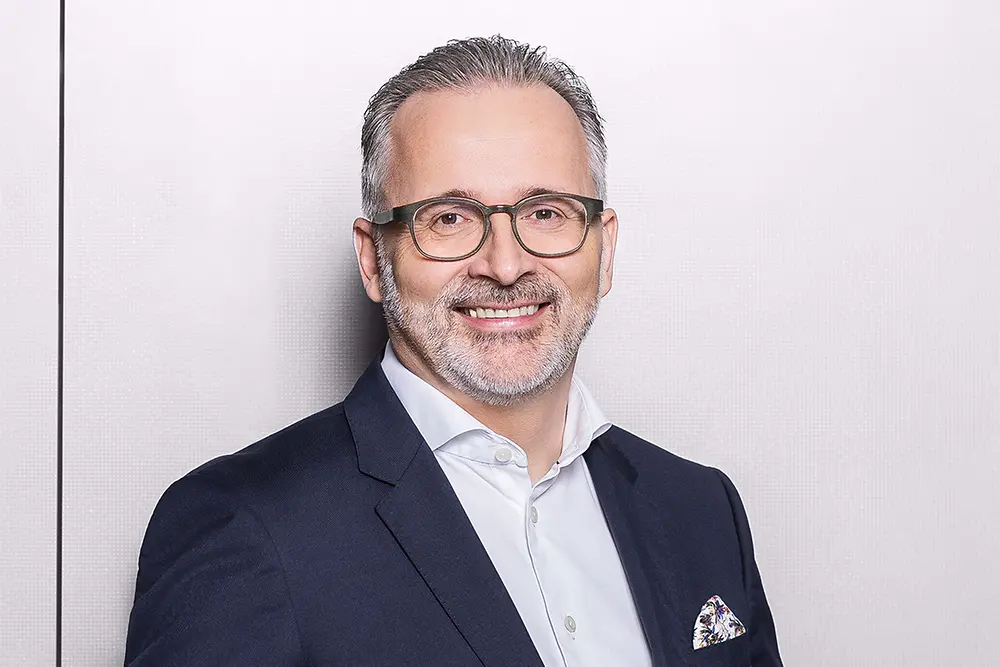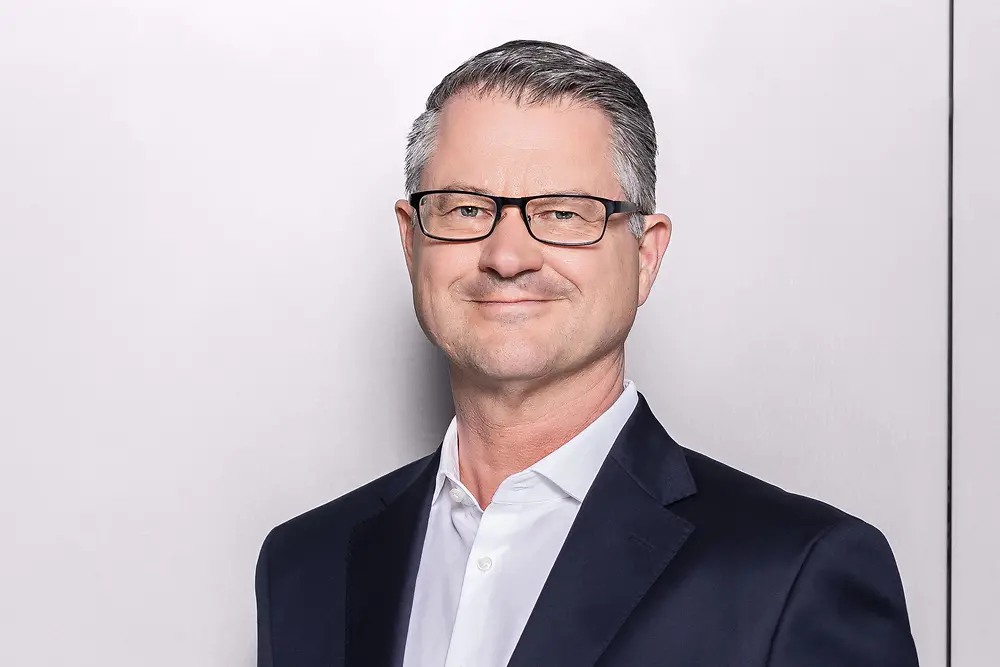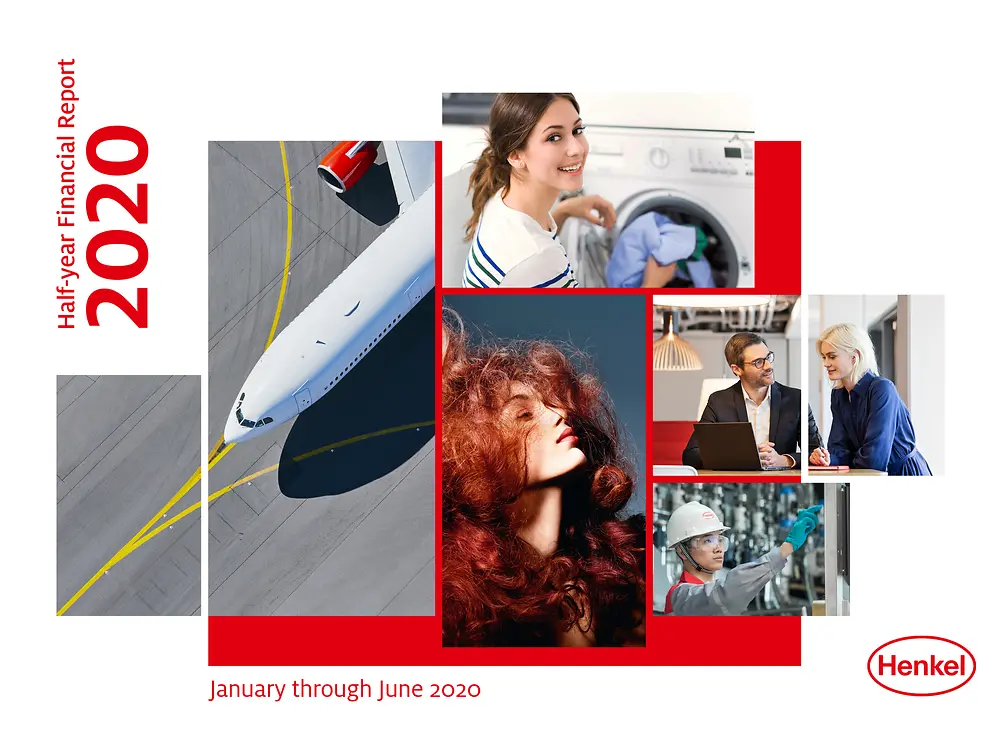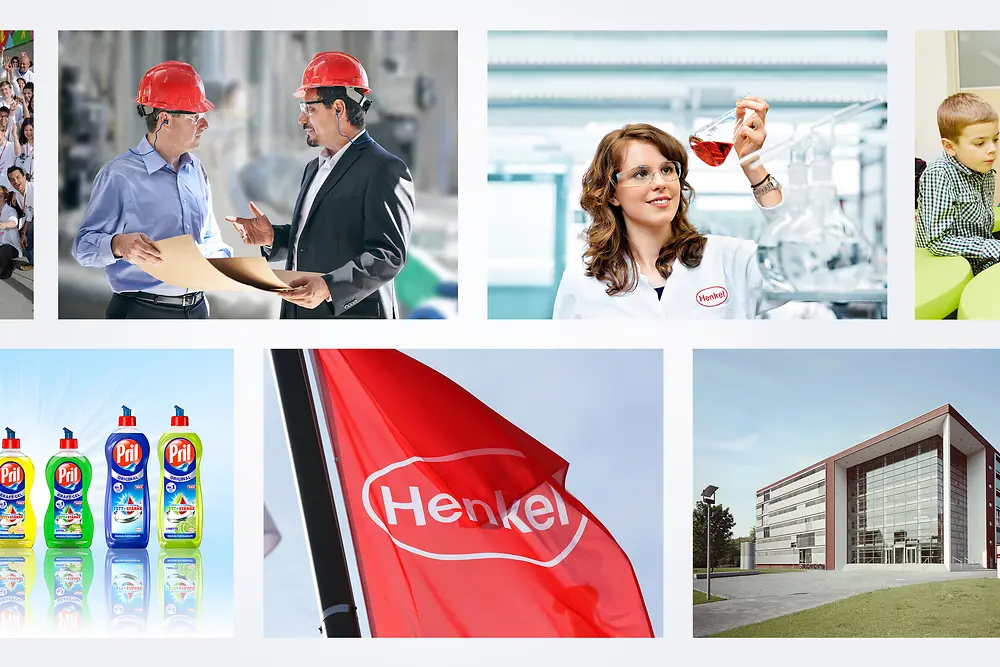- Focus on ensuring employee safety, supplying customers and supporting communities
- Group half-year sales reach 9,485 million euros, nominal: -6.0%, organic: -5.2%
- Operating profit* at 1,191 million euros, -27.5%
- EBIT margin* at 12.6%, -370 basis points
- Earnings per preferred share (EPS)*: -29.2% to 1.96 euros, -28.2% at constant exchange rates
- Free cash flow at 938 million euros, net financial position improved
- No new full-year outlook for 2020 due to continuing market uncertainties
- Implementation of new agenda for purposeful growth on track
“In the first half of 2020, Henkel was substantially impacted by the significant global economic downturn and the sharp decline in demand across many industries. During this unprecedented global crisis, our focus is to protect employees, supply customers, ensure business continuity and support communities. Thanks to the outstanding team spirit and commitment of our people around the world, we were able to achieve this in the first half of 2020. The breadth of our portfolio in the consumer and industrial businesses helped us to balance the impact of the crisis on our overall sales and earnings performance: In the first six months of 2020, we achieved sales of around 9.5 billion euros, an operating profit of 1.2 billion euros and 12.6 percent EBIT margin. We paid out the full dividend for 2019 to shareholders, and we were able to generate a very strong free cash flow and further improve our net financial position. During the crisis we did not introduce short-time working, apply for government aid or reduce our workforce due to the pandemic. In summary, we delivered an overall robust performance in an exceptionally challenging environment,” said Henkel CEO Carsten Knobel.
Henkel recorded sales of 9,485 million euros in the first half of 2020. This is a decline of -6.0 percent in nominal terms and -5.2 percent in organic terms compared to the first half of the prior year. Henkel also achieved an adjusted operating profit of 1,191 million euros in the first six months of 2020, -27.5 percent below the prior year. The adjusted EBIT margin was at 12.6 percent, -370 basis points lower than in the prior-year period.
In the course of the first six months, Adhesive Technologies was impacted primarily by significantly declining demand from key customer industries. Beauty Care performance was affected mostly by the significantly negative Hair Salon business, driven by the salon closures enforced in numerous countries. Laundry & Home Care showed a very strong development, also supported by a surge in demand for cleaning products.
“Given the continued uncertainties, however we cannot provide a new and reliable outlook for the full-year at this point in time,” said Carsten Knobel.
“As we are managing the current crisis, we remain fully dedicated to our ambitious growth agenda for the coming years. We started first initiatives in line with our new strategic framework and will continue to actively drive the implementation of our agenda for purposeful growth.”
Group sales and earnings performance in the first half of 2020
At 9,485 million euros, Henkel Group sales in the first half of 2020 were -6.0 percent below the prior-year period (Q2: 4,558 million euros; -11.0 percent). Organic sales, which exclude the impact of currency effects and acquisitions/divestments, showed a negative development of -5.2 percent (Q2: -9.4 percent). The contribution from acquisitions and divestments amounted to 0.3 percent (Q2: 0.2 percent). Currency effects had a negative impact of -1.1 percent on sales (Q2: -1.9 percent).
Emerging markets showed an organic sales development of -2.6 percent (Q2: -7.1 percent). Mature markets showed a negative organic sales development of -6.9 percent (Q2: -10.9 percent).
Half-year sales in Western Europe showed a negative organic development of -8.0 percent (Q2: -11.6 percent). Eastern Europe achieved organic growth of 3.1 percent (Q2: -3.8 percent). In Africa/Middle East, sales grew organically by 4.2 percent (Q2: 1.4 percent). North America recorded organic sales development of -6.4 percent (Q2: -10.9 percent). Latin America registered an organic sales development of -11.4 percent (Q2: -20.1 percent). In the Asia-Pacific region, sales decreased organically by -6.4 percent (Q2: -7.2 percent).
Adjusted operating profit (adjusted EBIT) decreased by -27.5 percent from 1,641 million euros in the first half of the previous year to 1,191 million euros in 2020.
Adjusted return on sales (adjusted EBIT margin) in the first six months reached 12.6 percent, -3.7 percentage points below the prior year.
Adjusted earnings per preferred share decreased by -29.2 percent from 2.77 euros in the first half of 2019 to 1.96 euros. At constant exchange rates, adjusted earnings per preferred share decreased by -28.2 percent.
Net working capital further improved to 4.4 percent of sales, significantly below the prior-year period (6.7 percent).
Free cash flow remained very strong, reaching 938 million euros in the first half of 2020 (First half 2019: 990 million euros).
Effective June 30, 2020, Henkel’s net financial position improved to -1,951 million euros (December 31, 2019: -2,047 million euros) – despite the payout of a dividend of around 800 million euros in the second quarter.
Business unit performance in first half of 2020
In the first half of 2020, sales in the Adhesive Technologies business unit were nominally -12.2 percent below prior-year level, reaching 4,153 million euros (Q2: 1,944 million euros, -19.7 percent). Organically, sales development was -10.9 percent (Q2: -17.4 percent). The development in the first half year and particularly in the second quarter was impacted by a significant decline in industrial and automotive production as a result of the COVID-19 pandemic. Adjusted operating profit decreased by 36.6 percent and reached 543 million euros. At 13.1 percent, adjusted return on sales was below the level of the first half of 2019. The margin decline was due in particular to the significantly lower sales volume as a result of the pandemic.
In the Beauty Care business unit, sales in the first half of 2020 showed an organic development of -8.5 percent (Q2: -12.8 percent). Nominally, sales were -7.4 percent below prior-year level, reaching 1,818 million euros (Q2: 883 million euros, -11.9 percent). The development is particularly due to the negative impacts of the COVID-19 pandemic on the Hair Salon business. Adjusted operating profit reached 172 million euros and was -35.4 percent below the level of the first half of 2019. Adjusted return on sales showed a negative development and reached 9.4 percent, particularly impacted by the declining sales volume in the Hair Salon business.
The Laundry & Home Care business unit generated organic sales growth of 4.9 percent in the first half of 2020 (Q2: 4.4 percent). Nominally, sales increased by 3.8 percent to 3,460 million euros (Q2: 1,705 million euros, 2.3 percent). At 531 million euros, adjusted operating profit was -6.0 percent below the prior-year period. At 15.3 percent, adjusted return on sales was below the level of the first half of 2019, especially due to the higher investments in marketing and advertising as well as digital and IT.
Purposeful growth agenda: Implementation of new strategic framework
At the beginning of March 2020, Henkel presented the company’s growth agenda for the coming years. Henkel has developed a clear strategic framework. It includes: a winning portfolio, competitive edge, particularly in the areas of innovation, sustainability, digitalization, a future-ready operating model as well as a strong corporate culture. “This strategic framework will help us to win the 20s for Henkel with a clear focus on purposeful growth,” Carsten Knobel explained. “Since the announcement in March we already made good progress in initiating first actions and implementing measures.”
A key element of Henkel’s future direction is an active portfolio management. Henkel has identified brands and categories with a total sales volume of more than one billion euros, predominantly in its consumer businesses, of which around 50 percent are marked to be divested or discontinued by the end of 2021. Despite the current market uncertainties, Henkel reconfirmed the portfolio measures to be executed in the announced timeframe. In the course of this year, Henkel already discontinued businesses and signed divestments with a total sales volume of around 80 million euros, mainly in the Adhesive Technologies business unit.
Along with active portfolio management, acquisitions remain an integral part of Henkel’s strategy. Recently, Henkel signed two transactions with a combined purchase price of around 500 million euros. In the Beauty Care business unit, Henkel expands its digital direct-to-consumer (D2C) activities through the acquisition of a majority stake in a business comprising three fast-growing premium beauty brands. In the Adhesive Technologies business, Henkel will expand its position in adhesives and sealants for consumers and craftsmen in North America with the acquisition of an attractive consumer sealants portfolio marketed under the GE brand**. The acquired business comprises a range of silicone sealants for various applications.
In order to further strengthen its competitive edge, Henkel will focus on accelerating impactful innovations, boosting sustainability as a differentiating factor and transforming digital into a customer and consumer value creator.
Henkel aims to accelerate impactful innovations, supported by increased investments. This includes an enhanced innovation approach. Innovations and brands will be supported with consistent investments in core categories and regions. Therefore, Henkel is committed to further step up growth investments in advertising, digital and IT. In the first six months of this year, and despite the macroeconomic challenges, Henkel stepped up these investments by a high double-digit million-euro amount.
In Adhesive Technologies, Henkel continued its investments into its state-of-the-art innovation center in Düsseldorf. In its consumer businesses, Henkel quickly ramped up an additional hygiene portfolio and production capacities for new hand sanitizers and cleaning products across different regions.
A key pillar of Henkel’s competitive edge strategy is clear differentiation in the market through impactful innovations. In Adhesive Technologies, Henkel used its broad industry portfolio for sealing and impregnation technology solutions to launch a new product line to increase the water resistance of high-end smartphones. This was a collaboration with one of the major smartphone brands in the world. Beauty Care launched the new Schwarzkopf brand Simply Color, based on the natural trends in the more “technological” category of hair coloration. The Laundry & Home Care business unit further rolled out Persil 4in1 Discs. Persil Discs are by now making up almost 10 percent of the overall sales under the Persil brand.
Sustainability is one of Henkel’s great strengths. The company has a leading role that is regularly confirmed in ratings and rankings. Therefore, Henkel aims to further strengthen its leading position in sustainability as a clear competitive edge. In order to further accelerate its efforts, Henkel has defined the next milestones and specific targets. One element is to become a climate-positive company by 2040.
As the first company globally, Henkel placed a plastic waste reduction bond in June 2020. By that, Henkel took another step in combining attractive corporate finance instruments with progress in sustainability. The proceeds from this bond with a total volume of around 100 million euros will be specifically allocated to projects and expenditures related to Henkel’s activities to reduce plastic waste. The bond underlines Henkel’s commitment to foster a circular economy and reduce plastic waste as well as to Sustainable Finance.
Henkel also expanded its Design for Recycling tool “EasyD4R”, which allows to quickly and reliably assess the recyclability of packaging at an early stage in the development process. The software, which has been made available for other companies and organizations, now covers not only different types of plastic packaging but also materials such as paper, glass or aluminum.
Henkel’s progress in the area of sustainability is also reflected in products for consumers and industrial customers. For example, in the Laundry & Home Care business, the Pro Nature range has been expanded by launching Somat and Bref Pro Nature. Pro Nature products meanwhile are available in 30 countries and include up to 99.9% natural ingredients and use packaging with up to 100% recycled plastic. Beauty Care launched solid shampoo, body and face bars under the brands Nature Box and N.A.E. – without plastic packaging. With Loctite Liofol, Adhesive Technologies introduced a certified recyclable heat and cold seal coating into the market, which enables the replacement of polyethylene with paper, suitable for a wide range of food and non-food packaging.
Next to innovation and sustainability, Henkel has defined digitalization as a key lever to strengthen its competitiveness. In the first half year, Henkel recorded a strong increase in digital sales of more than 60 percent in Beauty Care and Laundry & Home Care combined. For the Group, the digital share in overall sales is approaching the mid-teens percentage range. With its new unit “Digital Business”, Henkel wants to become the digital business leader in its industries and generate tangible value for its customers. Therefore, at the end of June, Henkel introduced a new operating model for its digital and IT activities and brought together IT teams, digital business experts, business process owners and HenkelX Ventures, led by Henkel’s Chief Digital & Information Officer (CDIO).
Lean, fast and future-ready business processes are another important element of Henkel’s strategic framework. The company regularly reviews its business processes and structures, assessing if they are lean, fast and simple, and adapts them to changing market developments and trends. In addition, new business models will be developed with the focus on ensuring proximity to customers and consumers. Henkel successfully implemented new operating models in Adhesive Technologies and its purchasing organization. In Laundry & Home Care and Beauty Care, the organizational changes to enhance regional focus and drive customer and consumer proximity are well on track.
Further developing Henkel’s corporate culture and accelerating the cultural transformation are other key elements of the company’s way forward. The aspiration is to foster a collaborative culture with empowered people and with the company’s leadership commitments at the core. For Henkel, it is key that employees continuously develop their professional and personal skills. In the first half of 2020, the company has therefore rolled out specifically designed training and upskilling projects, for example in the fields of leadership, digitalization and innovation. The current corona crisis has also proven the strong corporate culture of Henkel and the resilience and dedication of its employees worldwide.
Measures addressing COVID-19 pandemic
The COVID-19 pandemic has affected all areas of life and has severely impacted the global economy. In this crisis, the health and safety of the employees, customers and business partners are of the highest priority for Henkel. The company has introduced a broad range of protective measures at an early stage. At the same time, Henkel has made great efforts to continue its business activities and to serve customers and consumers around the world. In addition, Henkel launched a global solidarity program including financial donations, for example to the COVID-19 Solidarity Response Fund of the World Health Organization (WHO) and the United Nations (UN) Foundation and other selected organizations around the world. Furthermore, Henkel has donated more than 5 million products for personal and household hygiene and has produced disinfectants at its sites. Globally, Henkel has produced and donated more than 111,000 liters of disinfectant to support health authorities and hospitals. So far, Henkel supported almost 500 COVID-19-related projects in more than 40 countries worldwide helping almost 5 million people who have been in need through COVID-19.
“We will need to constantly adapt as the crisis evolves. We will react flexibly and quickly to the disruptions in our markets. Actively shaping change and breaking new ground,” Carsten Knobel summarized. “I am convinced that with our dedicated global team, our new strategic framework focusing on purposeful growth, our strong balance sheet and financial flexibility as well as our ability to generate strong cash flow, we are well positioned to deal with this difficult situation and that we will emerge stronger from the crisis.”
* Adjusted for one-time expenses and income, and restructuring expenses.
** GE is a trademark of General Electric Company, used under license.
This information contains forward-looking statements which are based on current estimates and assumptions made by the corporate management of Henkel AG & Co. KGaA. Statements with respect to the future are characterized by the use of words such as “expect”, “intend”, “plan”, “anticipate”, “believe”, “estimate”, and similar terms. Such statements are not to be understood as in any way guaranteeing that those expectations will turn out to be accurate. Future performance and results actually achieved by Henkel AG & Co. KGaA and its affiliated companies depend on a number of risks and uncertainties and may therefore differ materially from the forward-looking statements. Many of these factors are outside Henkel’s control and cannot be accurately estimated in advance, such as the future economic environment and the actions of competitors and others involved in the marketplace. Henkel neither plans nor undertakes to update any forward-looking statements.
This document includes – in the applicable financial reporting framework not clearly defined – supplemental financial measures that are or may be alternative performance measures (non-GAAP-measures). These supplemental financial measures should not be viewed in isolation or as alternatives to measures of Henkel’s net assets and financial positions or results of operations as presented in accordance with the applicable financial reporting framework in its Consolidated Financial Statements. Other companies that report or describe similarly titled alternative performance measures may calculate them differently.
This document has been issued for information purposes only and is not intended to constitute an investment advice or an offer to sell, or a solicitation of an offer to buy, any securities.
